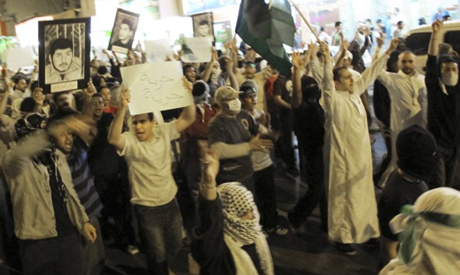
Saudi Shia protesters hold Saudi flags and portraits of unidentified Saudi Shia prisoners during a demonstration in Qatif, Saudi Arabia,Wednesday 9 March 2011. (AP)
Oil kingpin Saudi Arabia braced Friday for protests calling for political and economic reforms a day after witnesses said police shot and wounded three Shia demonstrators.
Online activists using the Facebook and Twitter have called for a "Day of Rage" and a "Saudi March 11 revolution" demanding a fully elected parliament and ruler in this conservative Islamic monarchy.
Security was strongly beefed up in the capital Riyadh in the early hours of Friday, after the interior ministry issued a stern reminder any kind of protest was illegal and unrest would not be tolerated.
Tensions rose late Thursday when security forces shot and wounded three Shia protesters in the city of Al-Qateef in Eastern Province, according to witnesses.
A royal official said Friday police responded to shooting from a man in the crowd, who was wounded by return fire and remains in custody. He did not confirm if any other people were injured.
The demonstrators were calling for the release of nine Shia prisoners who have been in jail for 14 years without trial, a witness told AFP.
Saudi Arabia, with about a quarter of the world's oil reserves, is a lynchpin of security in the Middle East and signs of unrest in the kingdom are being nervously monitored by the United States and other major powers.
Responding to Thursday's incident, the United States said it was keeping an eye on the situation and restated its support for universal values of human rights.
The Human Rights First Society of Saudi Arabia strongly condemned the police shootings in Eastern Province, which has the biggest concentration of Shia of any part of the mainly Sunni Muslim country.
"HRFS condemns, with the loudest and clearest words, the use of all kinds of force to disperse demonstrators, particularly when live ammunition was used last night against the demonstrators in Qatif," it said in a statement.
So far Saudi Arabia has been spared the political tumult that has gripped neighbouring countries like Yemen and swept the autocratic leaders of Egypt and Tunisia from power.
The kingdom's top clerics have also condemned as un-Islamic calls for demonstrations and petitions, saying "reform and advice do not take place through demonstrations and methods that fan sedition."
Dozens of police cars filled the strategic Olaya commercial centre in the Riyadh, which was hit by a blinding dust storm overnight, where the protesters are supposed to congregate.
Police patrols stood guard on the sides of the main roads of King Fahad and Olaya main street where security forces set up a checkpoint and were asking motorists for their identification.
Harnessing the power of new media like Facebook to spread their message, activists have urged Saudis to demonstrate in large numbers soon after the Friday prayers around 1000 GMT.
Protests have been called in most cities including Riyadh, Jeddah in the west and Dammam in the oil-rich east.
Activists are demanding far-reaching reform including representative government, an independent judiciary, the abolition of the secret police, the release of all political prisoners and guarantees of freedom of expression.
On the economic front, they seek a minimum monthly wage of 10,000 riyals ($2,667) and jobs for Saudis, in a country where the unemployment rate is 10.5 percent and soars to around 30 percent in the 20-29 age group.
The Gulf Civil Society Forum, a liberal pan-Gulf group, expected a low turnout because the call came from London-based dissidents who do not have a large following in the kingdom.
Other Facebook activists have called for nationwide protests on March 20.
On his return from surgery in the United States last month, King Abdullah decreed benefits estimated at more than $30 billion such as housing services and unemployment payments.
Crude prices turned lower in Asia on Friday as traders awaited further news on protests in Saudi Arabia, the world's biggest oil exporter, analysts said.
New York's main contract, light sweet crude for April delivery, fell 97 cents to $101.73 per barrel in the afternoon.
Brent North Sea crude for April dipped 39 cents to $115.04.
Short link: